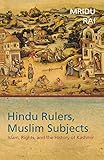Hindu Rulers, Muslim Subjects : Islam, Rights, and the History of Kashmir / Mridu Rai.
Material type: TextPublisher: Princeton, NJ : Princeton University Press, [2019]Copyright date: ©2004Description: 1 online resourceContent type:
TextPublisher: Princeton, NJ : Princeton University Press, [2019]Copyright date: ©2004Description: 1 online resourceContent type: - 9780691116884
- 9780691207223
- 954.6 23
- BP63.I4
- online - DeGruyter
- Issued also in print.
| Item type | Current library | Call number | URL | Status | Notes | Barcode | |
|---|---|---|---|---|---|---|---|
 eBook
eBook
|
Biblioteca "Angelicum" Pont. Univ. S.Tommaso d'Aquino Nuvola online | online - DeGruyter (Browse shelf(Opens below)) | Online access | Not for loan (Accesso limitato) | Accesso per gli utenti autorizzati / Access for authorized users | (dgr)9780691207223 |
Browsing Biblioteca "Angelicum" Pont. Univ. S.Tommaso d'Aquino shelves, Shelving location: Nuvola online Close shelf browser (Hides shelf browser)

|

|

|

|

|

|

|
||
| online - DeGruyter Greek and Roman Necromancy / | online - DeGruyter The Rebellion of the Daughters : Jewish Women Runaways in Habsburg Galicia / | online - DeGruyter An Intellectual History of Liberalism / | online - DeGruyter Hindu Rulers, Muslim Subjects : Islam, Rights, and the History of Kashmir / | online - DeGruyter Race Is about Politics : Lessons from History / | online - DeGruyter The Price of Whiteness : Jews, Race, and American Identity / | online - DeGruyter Why a Painting Is Like a Pizza : A Guide to Understanding and Enjoying Modern Art / |
Frontmatter -- Contents -- Acknowledgements -- Abbreviations -- Introduction -- 1. Territorializing Sovereignty: The Dilemmas of Control and Collaboration -- 2. The Consolidation of Dogra Legitimacy in Kashmir: Hindu Rulers and a Hindu State -- 3. The Obligations of Rulers and the Rights of Subjects -- 4. Contested Sites: Religious Shrines and the Archaeological Mapping of Kashmiri Muslim Protest -- 5. Political Mobilization in Kashmir: Religious and Regional Identities -- Conclusion -- Glossary -- Bibliography -- Index
restricted access online access with authorization star
http://purl.org/coar/access_right/c_16ec
Disputed between India and Pakistan, Kashmir contains a large majority of Muslims subject to the laws of a predominantly Hindu and increasingly "Hinduized" India. How did religion and politics become so enmeshed in defining the protest of Kashmir's Muslims against Hindu rule? This book reaches beyond standard accounts that look to the 1947 partition of India for an explanation. Examining the 100-year period before that landmark event, during which Kashmir was ruled by Hindu Dogra kings under the aegis of the British, Mridu Rai highlights the collusion that shaped a decisively Hindu sovereignty over a subject Muslim populace. Focusing on authority, sovereignty, legitimacy, and community rights, she explains how Kashmir's modern Muslim identity emerged. Rai shows how the princely state of Jammu and Kashmir was formed as the East India Company marched into India beginning in the late eighteenth century. After the 1857 rebellion, outright annexation was abandoned as the British Crown took over and princes were incorporated into the imperial framework as junior partners. But, Rai argues, scholarship on other regions of India has led to misconceptions about colonialism, not least that a "hollowing of the crown" occurred throughout as Brahman came to dominate over King. In Kashmir the Dogra kings maintained firm control. They rode roughshod over the interests of the vast majority of their Kashmiri Muslim subjects, planting the seeds of a political movement that remains in thrall to a religiosity thrust upon it for the past 150 years.
Issued also in print.
Mode of access: Internet via World Wide Web.
In English.
Description based on online resource; title from PDF title page (publisher's Web site, viewed 29. Feb 2020)


